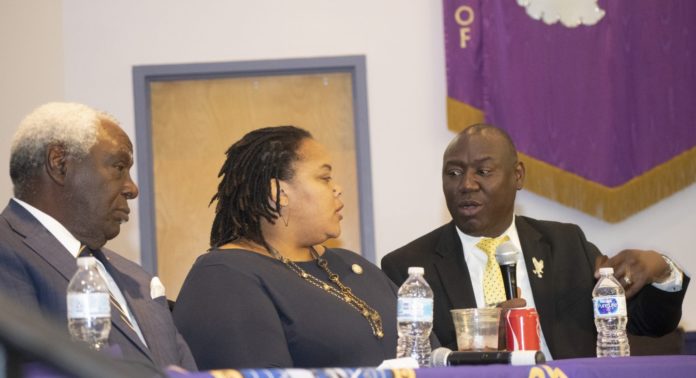Renowned trial lawyer Benjamin Crump says almost every police-shooting case he’s ever tried involved Tennessee vs. Garner, a landmark case that originated with a police shooting in Memphis in 1974.
The Tennessee vs. Garner decision prohibits police officers from shooting fleeing suspects unless they pose a significant threat to the officer or others and lays out the conditions that determine whether the shooting is justified.
On Friday at First Baptist Church-Broad, Crump engaged in a panel discussion that included attorney and former County Commissioner Walter Bailey, the lead attorney in the case. Sponsored by The Democratic Women of Shelby County, the discussion was titled “Tennessee vs. Garner – What did we learn and what has changed?”
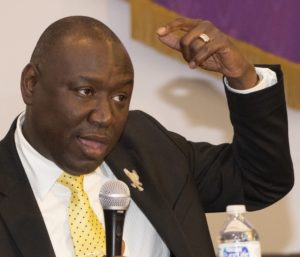
“In all honesty, when I think about Tennessee vs. Garner, it should have been a case that we could celebrate in the notion that they did hold the police officer accountable for killing this unarmed young black kid,” Crump said.
“What they have done with this opinion …is made it a road map for police officers to say the right things to get away with murder. I call it the intellectual justification for discrimination and you see it happen over and over again across America.”
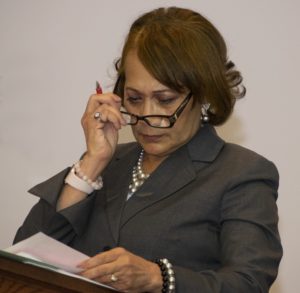
Circuit Court Judge Gina Higgins moderated the panel, which also featured Capt. Chuck Mays of the Shelby County Sheriff’s Office, Elana Delavega, associate professor of social work at The University of Memphis, and newly-elected County Commissioner Tami Sawyer.
The discussion event was held in the wake of last month’s shooting of Martavious Banks after a traffic stop and chase in South Memphis. The body and in-car cameras of the three officers involved were not on and that is part of the inquiries now underway by the Memphis Police Department and the Tennessee Bureau of Investigation (TBI).
Banks, who was critically injured, has survived the shooting. Protests ensued and some demonstrators were arrested as police moved forcefully after protesters did not respond as officers deemed necessary to clear blocked streets.
Now members of the Memphis City Council, Shelby County Commission and the state legislature are pushing measures that would require the TBI to investigate all officer-involved shootings. Current protocol calls for the TBI to only be called in if there is a death. Shelby County District Attorney made a special request in the shooting of Banks.
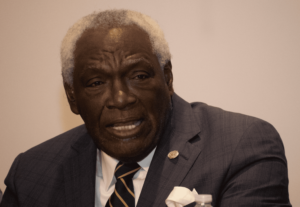
Bailey said in the early 70s there were nine killings involving police assigned to black neighborhoods in a very short period of time. He said the Memphis Branch NAACP sent the Garner case to his offices.
“It was our contention that under the Fourth Amendment of the U.S. Constitution…that it (killing) was a violation of his (suspect’s) rights,’’ Bailey said.
Bailey said he doesn’t know enough about the facts of the Banks shooting to know if police were justified in shooting him.
“The nuances and the facts make a huge difference in terms of the outcome of the case as it applies to Garner,” he said. “I do know that… whether they were justified or not will be governed by Tennessee vs. Garner …”
Crump said police officers often use the defense that they were in fear for their life in a shooting. “How do you prove that, that an officer is not in fear for his life?”

Mays said Tennessee vs. Garner was a three-day portion of his training when he started in law enforcement in 1997. He said the Sheriff’s Office has over 650 career standards and 375-plus policies and procedures.
Asserting that no one can know them all, Mays said he advises his young officers to make sure their moral compass is pointing in the right direction.
“I explain to them…you have seconds to make decisions…if your moral compass is pointed in the right direction, if your moral compass is pointed due north, we can get through that, we’re going to call that a teaching moment,” Mays said. “But if you go out and make a mistake, well then, guess what, I’m a police officer and I’m going to charge you.”

Delavega gave her measure of the moral compass in Memphis.
“Our moral compass is broken…we are still separate and unequal,” she said. “We’re not integrated we’re separated. Black people get the short end of the stick all the time…The moral compass of our entire community is broken.”
It’s necessary, Delavega said, to ask whether there is some form of racism or sexism. And, if there is, to ask, “What do I do? …It’s not the police. The police are part of the community. It’s the entire community.”

First Baptist Church-Broad Pastor Keith Norman said he often talks to the families of the victims of violence, saying they are the people who you don’t see.
“…When you take that 15-year-old child suddenly away from that family, you leave a hole in that family and grief for many years to come,” he said.
Norman said he has been involved in assessments that showed a very unbalanced training model was used in Memphis compared to law enforcement department across the country.
“What we’re really doing is training our officers to use force as a means of de-escalation instead of (teaching) de-escalation,” he said.
Officers involved in police shootings often resign and go to work for other police departments with their post certifications intact, he said. “And often they commit the same crime again.”
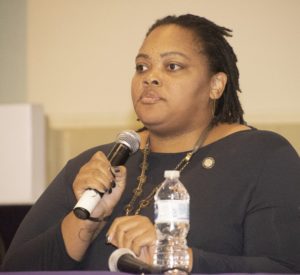
Sawyer, who chairs the law enforcement, corrections and courts committee, said the legislation she and County Commissioner (and still City Councilman) Edmund Ford Jr. are sponsoring – to make TBI investigations of police shootings standard procedure – is not anti-police.
“We’re not saying police officers are bad,” Sawyer said. “We’re saying the system is bad.”
She said the commission will be debating and possibly voting on the measure on Monday.



